-
When the global financial crisis (GFC) unfolded in 2008, the unemployment rate for 15 to 19-year-olds looking for full-time work in Australia increased from 15% to 25%. It has remained at this level ever since. In July, it stood at 25.5%. However, in the 10 areas listed by the Department of Human Services as the most disadvantaged in the country, the youth unemployment rate is more than 40%.
-

The proposed East-West tunnel being built in Melbourne’s inner-north has been delayed again as residents prevented soil testing by staging rolling protest actions. But the battle is likely to resume soon.
-
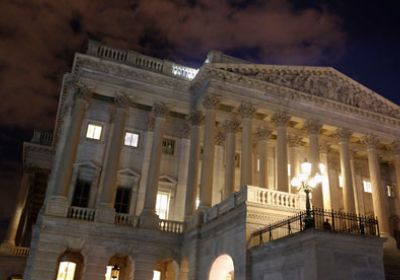 Amid bitter recriminations between the Democrats and Republicans over the partial shutdown of the government and the Republican threat of forcing of a United States government default, it is easy to forget what their policies have in common. Both have intervened to protect the interests of the capitalist class as a whole in the aftermath of the Great Recession at the expense of the working class. This is indisputable given statistics showing profits are soaring while real wages are declining. Both parties have implemented policies that cut the social wage for working people.
Amid bitter recriminations between the Democrats and Republicans over the partial shutdown of the government and the Republican threat of forcing of a United States government default, it is easy to forget what their policies have in common. Both have intervened to protect the interests of the capitalist class as a whole in the aftermath of the Great Recession at the expense of the working class. This is indisputable given statistics showing profits are soaring while real wages are declining. Both parties have implemented policies that cut the social wage for working people. -
 Germany’s September 22 federal elections delivered victory to the ruling conservative Christian Democratic Alliance, despite forces to their left winning a majority of seats. Die Linke (the Left Party) has emerged the third largest in the Bundestag (German parliament). The Chancellor Angela Merkel-led alliance scored their best result since German re-unification in 1990, with more than 18 million votes (41.5%).
Germany’s September 22 federal elections delivered victory to the ruling conservative Christian Democratic Alliance, despite forces to their left winning a majority of seats. Die Linke (the Left Party) has emerged the third largest in the Bundestag (German parliament). The Chancellor Angela Merkel-led alliance scored their best result since German re-unification in 1990, with more than 18 million votes (41.5%). -
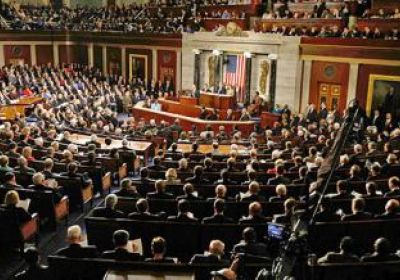 This month's battles over the budget and the Tea Party Republicans' fanaticism about the health care law obscure the two parties' common commitment to austerity, the US Socialist Worker said in an October 1 editorial. It is posted below. * * * The federal government officially went into shutdown mode at midnight on October 1 --in another spectacular display of dysfunction in the highest offices of the "world's greatest democracy".
This month's battles over the budget and the Tea Party Republicans' fanaticism about the health care law obscure the two parties' common commitment to austerity, the US Socialist Worker said in an October 1 editorial. It is posted below. * * * The federal government officially went into shutdown mode at midnight on October 1 --in another spectacular display of dysfunction in the highest offices of the "world's greatest democracy". -
The New Zealand government is rushing through the sale of Meridian Energy for NZ$1 billion less than the $3.1 billion needed to reach its goal of raising at least $5 billion from asset sales. It is moving ahead wit the sale widespread public opposition and criticism ranging from opposition parties to investment bankers. Meridian Energy Limited, a state-owned electricity generator and retailer, is expected to divest 49% of its shares as part of a government privatisation program.
-
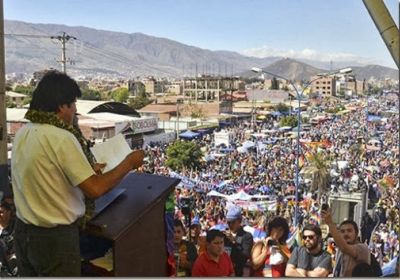 Washington’s refusal to allow Venezuela's President Nicolás Maduro to over-fly its colony of Puerto Rico on September 19 attracted little attention in the North American and European media. But in Latin America this arrogant gesture drew immediate outrage. It recalled the July 2 denial by four European countries — France, Italy, Spain and Portugal — of landing and refuelling rights and passage through their airspace to Bolivia’s president Evo Morales while he was returning home from a trip to Moscow.
Washington’s refusal to allow Venezuela's President Nicolás Maduro to over-fly its colony of Puerto Rico on September 19 attracted little attention in the North American and European media. But in Latin America this arrogant gesture drew immediate outrage. It recalled the July 2 denial by four European countries — France, Italy, Spain and Portugal — of landing and refuelling rights and passage through their airspace to Bolivia’s president Evo Morales while he was returning home from a trip to Moscow. -
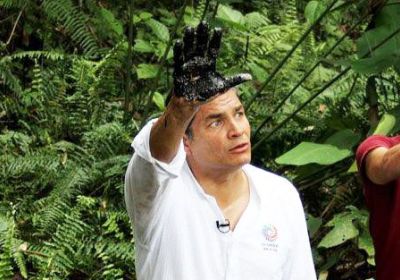
During a visit to New York for the United Nations General Assembly, Ecuador’s foreign minister Ricardo Patino joined independent media outlet Democracy now! on September 23 to discuss his government’s involvement in two closely watched environmental legal battles.
-
Something is looming in the shadows that could help erode our basic rights and contaminate our food. The Trans Pacific Partnership (TPP) has the potential to become the biggest regional free-trade agreement in history, both in economic size and the ability to quietly add more countries in addition to those originally included.
-
 “Arthur's Day”, that ingenious marketing campaign thought up in 2009 to mark the 250th anniversary of the Guinness brewing company and to raise further sales of “the black stuff”, will be celebrated most of all by executives, sales teams and shareholders on September 26. According to Diageo (the British-based conglomerate that now owns Guinness), on September 26 every year: “Guinness fans around the world will come together at a series of exciting musical events to raise a glass to Arthur Guinness and celebrate those who like him, make great things happen.”
“Arthur's Day”, that ingenious marketing campaign thought up in 2009 to mark the 250th anniversary of the Guinness brewing company and to raise further sales of “the black stuff”, will be celebrated most of all by executives, sales teams and shareholders on September 26. According to Diageo (the British-based conglomerate that now owns Guinness), on September 26 every year: “Guinness fans around the world will come together at a series of exciting musical events to raise a glass to Arthur Guinness and celebrate those who like him, make great things happen.” -
 Karl Marx: A Nineteenth Century Life Jonathan Sperber Liveright Publishing, 2013 In life, Karl Marx lived a tumultuous, revolutionary life. His death, too, has been less than tranquil. Alive, he was the best hated man in Europe. For the ruling classes and police spies he personified the “spectre” that was haunting the continent, the demonic rise of workers’ revolution. After his death he was bleached of his humanity, canonised by admirers and slandered by enemies. Both misrepresented him.
Karl Marx: A Nineteenth Century Life Jonathan Sperber Liveright Publishing, 2013 In life, Karl Marx lived a tumultuous, revolutionary life. His death, too, has been less than tranquil. Alive, he was the best hated man in Europe. For the ruling classes and police spies he personified the “spectre” that was haunting the continent, the demonic rise of workers’ revolution. After his death he was bleached of his humanity, canonised by admirers and slandered by enemies. Both misrepresented him. -
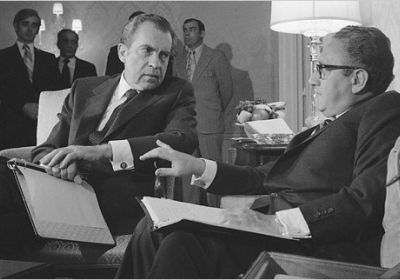 The most important anniversary of the year was the 40th anniversary of September 11, 1973 — the crushing of the democratic government of Chile by General Augusto Pinochet and Henry Kissinger, then US secretary of state. The National Security Archive in Washington has posted new documents that reveal much about Kissinger's role in an atrocity that cost thousands of lives. In declassified tapes, Kissinger is heard planning with President Richard Nixon the overthrow of left-wing President Salvador Allende. They sound like Mafiosi thugs.
The most important anniversary of the year was the 40th anniversary of September 11, 1973 — the crushing of the democratic government of Chile by General Augusto Pinochet and Henry Kissinger, then US secretary of state. The National Security Archive in Washington has posted new documents that reveal much about Kissinger's role in an atrocity that cost thousands of lives. In declassified tapes, Kissinger is heard planning with President Richard Nixon the overthrow of left-wing President Salvador Allende. They sound like Mafiosi thugs.
Economy
Economy